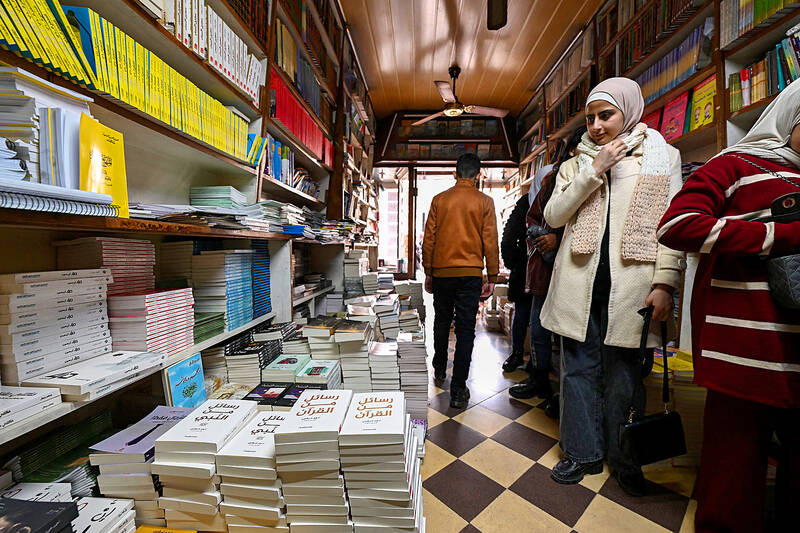Books recounting torture in Syrian prisons or texts on radical Islamic theology now sit openly in Damascus bookstores, no longer traded in secret after iron-fisted ruler Bashar al-Assad’s ouster.
“If I had asked about a [certain] book just two months ago, I could have disappeared or ended up in prison,” said student Amr al-Laham, 25, who was perusing stores near Damascus University.
He has finally found a copy of Al-Maabar (The Passage) by Syrian author Hanan Asad, which recounts the conflict in Aleppo from a crossing point linking the city’s rebel-held east with the government-held west, before al-Assad’s forces retook complete control in 2016.

Photo: AFP
Last month, Islamist-led rebels captured the northern city in a lightning offensive, going on to take Damascus and toppling al-Assad, ending more than half a century of his family’s oppressive rule.
“Before, we were afraid of being marked by the intelligence services” for buying works including those considered leftist or from the ultra-conservative Salafi Muslim movement, Laham said.
While many say the future is uncertain after al-Assad’s fall, Syrians for now can breathe more easily, free from the omnipresent security apparatus in a country battered by war since 2011 after al-Assad brutally repressed peaceful anti-government protests.
Syria’s myriad security agencies terrorized the population, torturing and killing opponents and denying basic rights such as freedom of expression.
Al-Assad brutally repressed any hint of dissent and his father before him did the same, notoriously crushing a Muslim Brotherhood-led rebellion in the 1980s.
Several books that were previously banned and only available to Syrians if they were pirated online now frequently pop up on footpath displays or inside bookshops.
They include The Shell, by Syrian author Mustafa Khalifa, a devastating tale of an atheist who is mistaken for a radical Islamist and detained for years inside Syria’s infamous Tadmur prison.
Another is My Aunt’s House — an expression used by Syrians to refer to prison — by Iraqi author Ahmed Khairi Alomari.
Prison literature “was totally forbidden,” a bookshop owner in his 50s said, identifying himself as Abu Yamen. “Before, people didn’t even dare to ask — they knew what awaited them.”
Elsewhere, the owner of a high-profile publishing house said that since the 1980s, he had stopped printing all political works except some “very general [essays] on political thinking that did not deal with a particular region or country.”
Even so, al-Assad’s “security services used to call us in to ask about our work and our sales — who came to see us, what they bought, what people were asking for,” he said, requesting anonymity.
He said security services were often “uncultured” when it came to literature, recalling an investigator who insisted he wanted to question Ibn Taymiyya, a Sunni Muslim theologian who died in the 14th century.
In shelves at the entrance of his Damascus bookshop, Abdel Rahman Suruji displays leather-bound works emblazoned with golden calligraphy of Ibn Qayyim al-Jawziyya, a medieval Muslim theologian and important Salafi ideologue.
Also on display are tomes by Sayyed Qotb, a theoretician behind the Muslim Brotherhood who inspired its radicalization.
“All these books were prohibited. We sold them in secret, just to those who we could trust — students we knew or researchers,” said Suruji, 62.
Now, they are in “high demand,” he said.
He added that his new customers include Damascus residents and Syrians who have returned from abroad or visiting from former rebel bastions in the country’s north.
Suruji said that although he learnt to tell a real student from an informant, a dozen security agents went through his bookshop from top to bottom in 2010, confiscating “more than 600 books.”
Mustafa al-Kani, 25, a student of Islamic theology, came to check the price of a collection of Sayyed Qotb’s works.
“During the revolution, we were afraid of looking for certain books. We couldn’t have them in our possession; we used to read them online,” he said.
“Just publishing a quote from Sayyed Qotb could get you thrown into jail,” he added.

ANGER: A video shared online showed residents in a neighborhood confronting the national security minister, attempting to drag her toward floodwaters Argentina’s port city of Bahia Blanca has been “destroyed” after being pummeled by a year’s worth of rain in a matter of hours, killing 13 and driving hundreds from their homes, authorities said on Saturday. Two young girls — reportedly aged four and one — were missing after possibly being swept away by floodwaters in the wake of Friday’s storm. The deluge left hospital rooms underwater, turned neighborhoods into islands and cut electricity to swaths of the city. Argentine Minister of National Security Patricia Bullrich said Bahia Blanca was “destroyed.” The death toll rose to 13 on Saturday, up from 10 on Friday, authorities

DEBT BREAK: Friedrich Merz has vowed to do ‘whatever it takes’ to free up more money for defense and infrastructure at a time of growing geopolitical uncertainty Germany’s likely next leader Friedrich Merz was set yesterday to defend his unprecedented plans to massively ramp up defense and infrastructure spending in the Bundestag as lawmakers begin debating the proposals. Merz unveiled the plans last week, vowing his center-right Christian Democratic Union (CDU)/Christian Social Union (CSU) bloc and the center-left Social Democratic Party (SPD) — in talks to form a coalition after last month’s elections — would quickly push them through before the end of the current legislature. Fraying Europe-US ties under US President Donald Trump have fueled calls for Germany, long dependent on the US security umbrella, to quickly

Local officials from Russia’s ruling party have caused controversy by presenting mothers of soldiers killed in Ukraine with gifts of meat grinders, an appliance widely used to describe Russia’s brutal tactics on the front line. The United Russia party in the northern Murmansk region posted photographs on social media showing officials smiling as they visited bereaved mothers with gifts of flowers and boxed meat grinders for International Women’s Day on Saturday, which is widely celebrated in Russia. The post included a message thanking the “dear moms” for their “strength of spirit and the love you put into bringing up your sons.” It

In front of a secluded temple in southwestern China, Duan Ruru skillfully executes a series of chops and strikes, practicing kung fu techniques she has spent a decade mastering. Chinese martial arts have long been considered a male-dominated sphere, but a cohort of Generation Z women like Duan is challenging that assumption and generating publicity for their particular school of kung fu. “Since I was little, I’ve had a love for martial arts... I thought that girls learning martial arts was super swaggy,” Duan, 23, said. The ancient Emei school where she trains in the mountains of China’s Sichuan Province